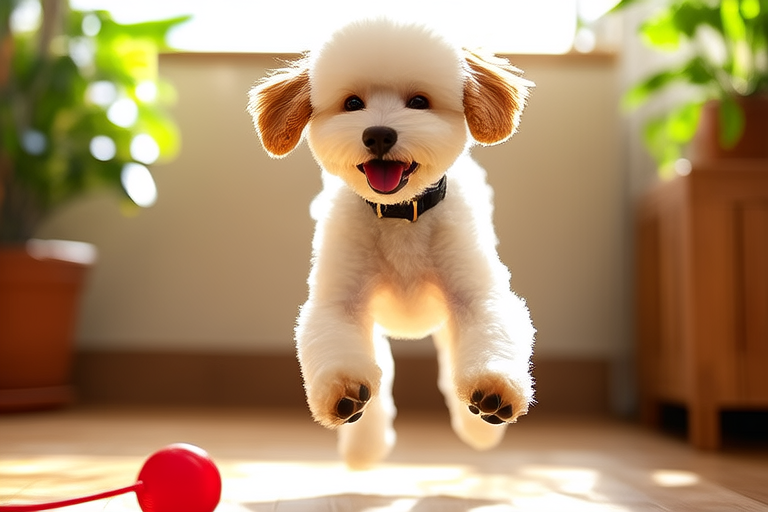How to Keep Your Poodle Happy and Healthy Every Day
Welcome to this comprehensive guide on how to keep your beloved poodle happy and healthy every day. Whether you’re a seasoned poodle owner or a new pet parent, understanding the unique needs of your poodle is crucial for ensuring they live a long, healthy, and joyful life. This article will cover essential topics such as dietary needs, exercise, mental stimulation, grooming, health issues, socialization, and relationship maintenance.
Dietary Needs Tailored for Poodles
Feeding your poodle a balanced diet is fundamental to their overall health. Poodles are prone to obesity, so it’s important to choose high-quality dog food that suits their age, size, and activity level. Look for food that contains real meat as the primary ingredient and avoids fillers like corn or soy. Consult with your veterinarian to determine the right amount of food per day based on your poodle’s weight and metabolism.
Additionally, consider adding supplements to your poodle’s diet if necessary. Omega-3 fatty acids, found in fish oil, can promote healthy skin and coat, while glucosamine and chondroitin support joint health, especially beneficial for older poodles. Always consult your vet before introducing any new supplement to ensure it’s safe and appropriate for your dog.
The Importance of Regular Exercise Routines
Poodles are energetic dogs that require regular physical activity to stay fit and healthy. Daily walks, runs, and play sessions are essential for burning off excess energy and preventing behavioral issues. Aim for at least 30 minutes of exercise daily, but more active poodles may need up to an hour or two. Incorporate various forms of exercise to keep things interesting, such as swimming, agility training, or fetch.
Exercise also plays a critical role in maintaining your poodle’s mental health. It helps reduce stress and anxiety, which are common issues in dogs. By keeping your poodle physically active, you’re also helping them mentally. Remember to tailor the intensity and duration of exercise according to your poodle’s age, fitness level, and any existing health conditions.
Suitable Mental Stimulation Activities
Mental stimulation is just as important as physical activity for poodles. These intelligent dogs thrive on challenges and puzzles that engage their minds. Provide your poodle with interactive toys, such as treat-dispensing puzzles or scent games, to keep them mentally stimulated. Training sessions are also excellent for mental engagement, teaching new tricks, and reinforcing good behavior.
Consider enrolling your poodle in obedience classes or agility training. These activities not only provide mental stimulation but also help strengthen the bond between you and your pet. Additionally, these activities can improve your poodle’s confidence and self-esteem, leading to a happier and more well-adjusted dog.
Grooming Requirements Specific to Their Coat
Poodles have a hypoallergenic coat that requires regular grooming to maintain its health and appearance. Their coat grows continuously, so frequent brushing is necessary to prevent matting and tangling. Brush your poodle at least three times a week, using a slicker brush or pin brush. Bathing should be done every four to six weeks, depending on their activity level and coat condition.
Professional grooming is recommended every six to eight weeks to keep your poodle’s coat in top shape. During grooming sessions, your poodle will receive a thorough cleaning, haircut, nail trimming, ear cleaning, and dental care. If you prefer to groom your poodle at home, invest in quality grooming tools and learn proper techniques to avoid causing discomfort or injury.
Common Health Issues and Preventive Care
Despite being generally healthy, poodles are prone to certain health issues. Hip dysplasia, luxating patellas, and progressive retinal atrophy are some common concerns. Regular veterinary check-ups, vaccinations, and screenings can help detect and manage these issues early. Maintaining a healthy weight, providing proper nutrition, and ensuring regular exercise can also contribute to your poodle’s overall health.
Vaccinations are crucial for protecting your poodle against diseases like distemper, parvovirus, and rabies. Heartworm prevention is equally important, as poodles are susceptible to heartworms transmitted by mosquitoes. Discuss the best preventive measures with your veterinarian, including the frequency of vaccinations and the most effective heartworm medication.
Advice on Socialization
Proper socialization is vital for raising a well-behaved and confident poodle. Expose your puppy to various environments, people, and other animals from a young age to help them become comfortable in different situations. Positive reinforcement training methods, such as treats and praise, can encourage good behavior during socialization.
Continue socializing your poodle throughout their life, especially if they show signs of fear or aggression. Gradual exposure to new experiences can help build their confidence and reduce anxiety. Remember that socialization is a lifelong process, and ongoing efforts can significantly impact your poodle’s behavior and temperament.
Tips for Maintaining a Positive Relationship with Your Poodle
Maintaining a strong bond with your poodle is key to their happiness and well-being. Spend quality time together every day, whether it’s playing fetch, going for a walk, or simply cuddling. Consistency in routine and communication fosters trust and strengthens the relationship between you and your pet.
Positive reinforcement training is highly effective for building a positive relationship with your poodle. Reward good behavior with treats, praise, and affection, and avoid harsh punishments. By focusing on rewarding desired behaviors, you’ll encourage your poodle to repeat those actions and develop a stronger bond with you.
Lastly, be patient and understanding with your poodle. Every dog is unique, and what works for one may not work for another. Take the time to understand your poodle’s individual needs and preferences, and adjust your approach accordingly. With patience, love, and consistency, you can ensure your poodle lives a happy and healthy life.
In conclusion, keeping your poodle happy and healthy involves addressing their dietary needs, providing regular exercise, offering mental stimulation, maintaining proper grooming, preventing health issues, socializing them appropriately, and fostering a strong relationship. By following these guidelines, you can ensure your poodle enjoys a long, fulfilling life filled with joy and companionship.
